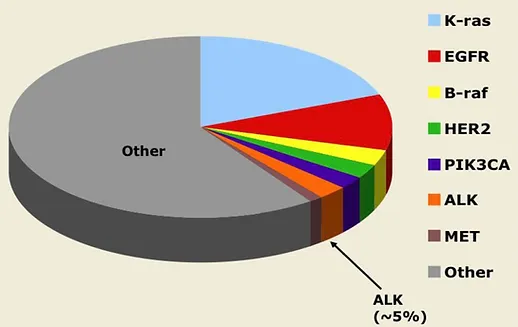ALK+ Awareness: June ALK+ Awareness Month


What Is ALK-Positive Lung Cancer?
ALK-positive cancer is a type of cancer with no known cause, and no known cure (once it has spread to other parts of the body).
It is caused by a mutation of the ALK gene. It is not thought to be a disease that is inherited, or can be passed on to others in any way. It is thought to occur in about 100,000 people, worldwide, every year.
ALK+ refers to the presence of anaplastic lymphoma kinase (ALK) gene rearrangements or mutations in certain cancers. The ALK gene encodes for a protein involved in cell signaling and growth regulation. When the ALK gene undergoes rearrangement or mutation, it can lead to the overactivity of the ALK protein, which can promote the development and progression of cancer.
ALK+ is most commonly associated with a type of cancer called anaplastic large-cell lymphoma (ALCL) and a subset of non-small cell lung cancer (NSCLC). In ALCL, the ALK gene rearrangement leads to the fusion of ALK with another gene, resulting in the production of an abnormal ALK protein. In NSCLC, ALK gene rearrangements also occur, resulting in the production of abnormal ALK proteins.
The identification of ALK+ cancers is important because it has treatment implications. Targeted therapies, such as ALK inhibitors, have been developed to specifically target the abnormal ALK protein and inhibit its activity. These therapies have shown significant efficacy in treating ALK+ cancers, leading to improved outcomes for patients.
Symptons
Lung cancer may not show symptoms until you’ve had it long enough for it to spread to other parts of your body. It is harder to treat as it progresses, so do not delay checking in with a doctor.
If you suspect that you have any symptoms of lung cancer, like those below, see your doctor immediately:
- Non-Small Cell Lung Cancer (NSCLC):
- Persistent cough or change in chronic cough pattern
- Shortness of breath or wheezing
- Chest pain
- Fatigue
- Unexplained weight loss
- Recurrent respiratory infections
- Coughing up blood
- Anaplastic Large-Cell Lymphoma (ALCL):
- Enlarged lymph nodes (usually painless)
- Swelling or mass in the neck, armpit, or groin
- Fever and night sweats
- Unexplained weight loss
- Fatigue or weakness
- Itching or rash
It’s important to note that these symptoms can also occur in other conditions, and the presence of ALK+ mutation does not necessarily mean that all these symptoms will be present
Life Expectancy / Prognosis
Things are looking WAY up for ALK-positive patients. Two decades ago, patients with stage 4 NSCLC had a 2% chance of achieving 5-year survival rate, according to NCI data.
But because ALK-positive lung cancer is so responsive to TKI medications, there has been rapid increases in patient life expectancy. A study in December 2018 found that the median survival for people with stage 4 (IV) ALK-positive lung cancer was 6.8 years with the right care. That was two years ago. Importantly, because 6.8 years survival was the median, approximately 50% of patients also lived longer than 6.8 years.
Depending on several factors – including the specific type and stage of cancer, the overall health of the patient, and the effectiveness of available treatments. It is important to note that I am an AI language model and cannot provide specific medical advice or predict individual outcomes.
In recent years, advancements in targeted therapies have significantly improved the prognosis and life expectancy for patients with ALK+ cancers. Drugs such as crizotinib, ceritinib, alectinib, and brigatinib have shown promising results in treating ALK+ NSCLC. Similarly, in ALK+ ALCL, chemotherapy combined with targeted therapies like crizotinib or brentuximab vedotin has demonstrated positive outcomes.
Organizations Involved in ALK+
Here are some organizations worldwide that are involved in research, support, and advocacy for ALK+ cancer:
- ALK Positive:
- Website: https://www.alkpositive.org
- LUNGevity Foundation:
- Website: https://lungevity.org/
- LUNGevity Foundation is a U.S.-based organization that focuses on lung cancer research, education, support, and advocacy. They have specific resources and programs dedicated to ALK+ NSCLC.
- Bonnie J. Addario Lung Cancer Foundation (ALCF):
- Website: https://www.lungcancerfoundation.org/
- The ALCF is a nonprofit organization based in the United States that aims to improve the lives of lung cancer patients through research, education, and support. They have initiatives focused on ALK+ NSCLC.
- The International Association for the Study of Lung Cancer (IASLC):
- Website: https://www.iaslc.org/
- IASLC is a global organization dedicated to the study of lung cancer. They promote research, education, and collaboration among healthcare professionals and researchers worldwide. Their work covers various aspects of lung cancer, including ALK+ NSCLC.
- Lungevity Europe:
- Website: https://www.lungevity.eu/
- Lungevity Europe is a European branch of the LUNGevity Foundation. They focus on providing support, information, and resources to lung cancer patients in Europe, including those with ALK+ NSCLC.
More Links
https://www.cancer.gov/publications/dictionaries/cancer-terms/def/alk-positive
https://en.wikipedia.org/wiki/ALK_positive_lung_cancer
www.alkpositive.org.uk
https://www.news18.com/opinion/alk-positive-cancer-a-survivors-perspective-8082013.html


